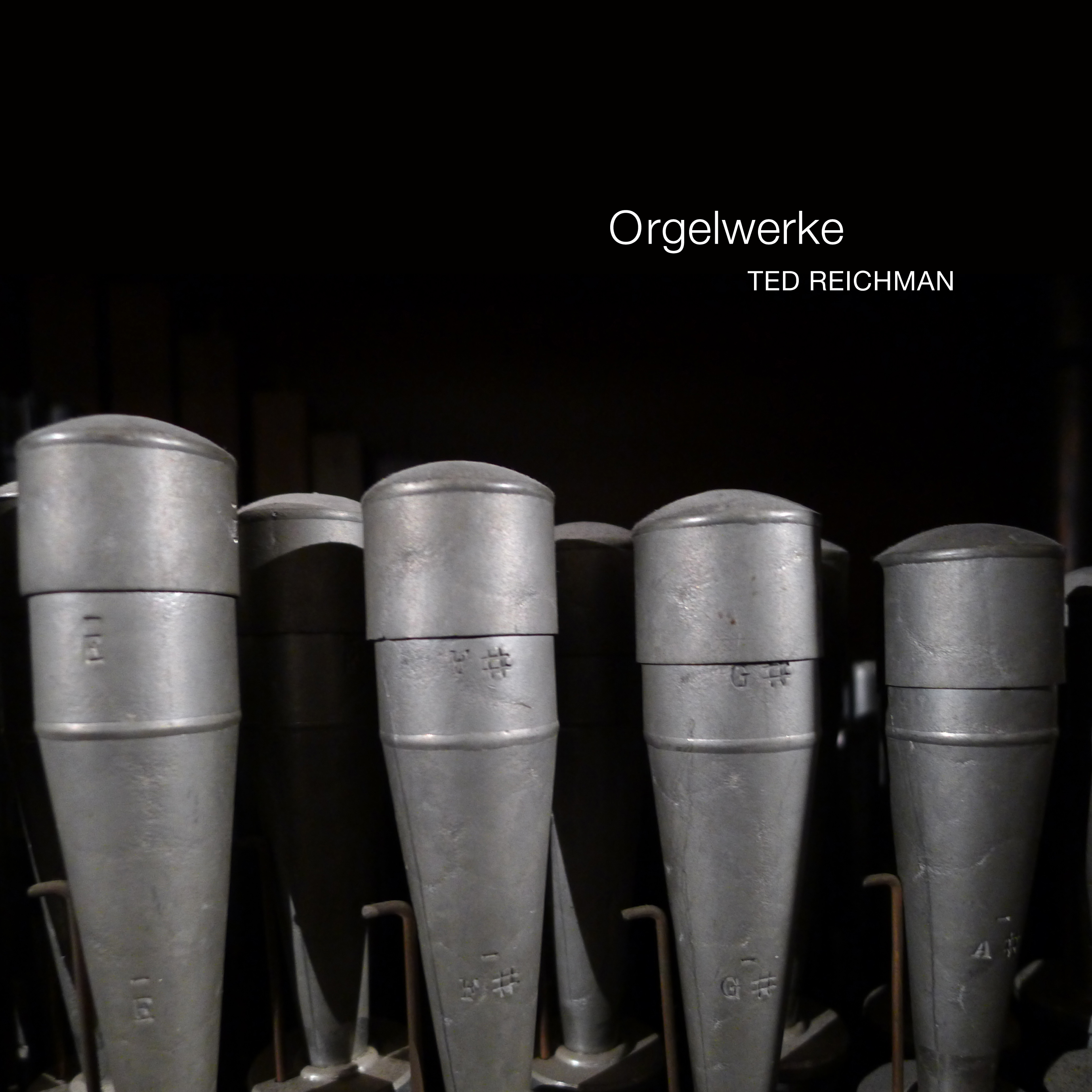
DL – 4 tracks – 39:38
Release date: Friday 20th January 2023
Track listing:
1. fond du lac
2. rondo
3. american dream
4. geisterorchester
Photography & design by Jon Wozencroft
Mastered by Simon Scott @ SPS
Orgelwerke began when composer Ted Reichman picked up a pile of rare organ vinyl from a library’s discard box. As he listened to this forgotten music late at night, he developed a process of transformation. He digitised them, turning them into loops and gestures, then reshaped them with tape, broken amplifiers and analogue echo boxes. It became something like a ritual, an exhumation of long-unheard music reanimated as glacial drones and ghostly symphonic movements – the sound of the cathedral transmuted into an enveloping shadow of pulsation, echo and glitch.
Ted Reichman composes electro-acoustic music, open-form pieces for improvising musicians, and film music. His long career in music goes back to his first recordings with Anthony Braxton in the early 1990s and his deep involvement in New York’s music community in the 2000’s. He was the original curator at Tonic on the Lower East Side of NYC, which became one of the world’s crucial venues for avant-garde music. He has made recordings for Tzadik, Skirl, and Tripticks Tapes, and produced and mixed albums for Wendy Eisenberg, Steven Long, Lina Tullgren/Alec Toku Whiting and many other experimental musicians. His film scores include Rick (with Bill Pullman and Sandra Oh), The Memory Thief, and the award winning documentaries <> and Missing In Brooks County. He has been on the faculty of the Jazz Studies and Contemporary Musical Arts departments at the New England Conservatory of Music for over ten years, where he has developed a new curriculum on recording.
credits:
Recorded and mixed at Subtext Sound System
Thanks to Jason Coleman, Steve Long, Alec Toku Whiting, Tyler Gilmore and all at the MIT Radio Society
Reviews:
Burning Ambulance (US):
Composer Ted Reichman also has an album of organ music out this week, sort of. The genesis of Orgelwerke was a stack of organ LP’s he grabbed from a library’s discard box. He began to pluck chunks of the music out, turn it into digital loops, then warp and process and recontextualise it into new pieces. The four tracks on the CD run between seven and 12 minutes, and they have a kind of William Basinski meets Thomas Köner meets Angelo Badalamenti’s-Eraserhead-soundtrack quality. The tones fade slowly in, and hover in a kind of glimmering but also gradually disintegrating cloud. There are multiple layers of things all happening at once, so it’s like being surrounded by organ players at times, and each track builds to a kind of ecstatic crescendo before washing away like the tide going out. If you play this loud enough, it’ll probably shake your speakers off the shelf. [Phil Freeman]
Ambientblog (Netherlands):
Over the years, the church organ has become quite a popular instrument in experimental music settings. No real surprise, knowing the extreme dynamics the instrument has: it can go from whispering silence to intimidating thunder within seconds. And its natural habitat, a reverberating church, always adds an extra dimension to the experience.
But for his Orgelwerke (Organ Works) Ted Reichman took a different approach to the instrument. Finding ‘a pile of rare organ vinyl in a library’s discard box, […] he digitized them, turning them into loops and gestures, then reshaped them with tape, broken amplifiers, and analogue echo boxes,’ and you can simply trust a composer who studied experimental music and ethnomusicology with people like Alvin Lucier and Anthony Braxton to come up with something interesting!
But at the same time, this music does not sound like a usual church organ recording. The source is altered and modified to a different sonic entity, even if it still has its recognisable roots in the original instrument. In a fascinating way, these loops and soundscapes become ‘non-electronic electronic’ music.
The original recordings are looped into drones, but not the minimalist kind of drones: there is quite a lot happening here. The twelve-minute closing track Geisterorchester (Ghost Orchestra), especially, unleashes the full power a church organ is capable of, while also including the original sounds of a lightly scratched vinyl recording.
This is not exactly ‘ambient’ music: it requires active attention to be fully appreciated. So, perhaps, best file it under ‘power ambient’ – because it works best when played LOUD.
Orgelwerke is a download-only release; there is no physical edition. [Peter van Cooten]
Nieuwe Noten (NL):
En uiteindelijk hebben we die zingende klankwolken van Reichman, muziek die de drone van deze albums het meest dicht benadert. We beginnen met ‘Fond du Lac’. Eerst een stil hangende klankwolk, verderop een vaag ritmisch patroon en naar het einde toe wegebbende klanken. Uiterst langzaam komt ‘Rondo’ op gang, steeds verder winnend aan klank. Veel variatie zit er verder niet in dit stuk, alleen krijgt de muziek halverwege een wat meer vliedend karakter. En even geleidelijk als de muziek opkomt, neemt hij tegen het einde ook weer af. ‘American Dream’ is ongeveer de helft korter maar verschilt verder niet zo veel van ‘Rondo’, ook hier gebeurt dus opvallend weinig. Het meest kleurrijk is nog ‘Geisterorchester’ waar het album mee besluit. Vooral opvallend zijn hier de hoge tonen.
De albums zijn (deels) te beluisteren via Bandcamp en daar ook te koop. [Ben]










